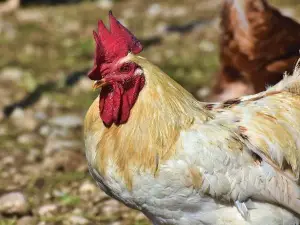
A change in the appearance or behavior of your chicken is usually a sign that there is something going on with your bird. This change can be something minor, or it can be something major or even life-threatening.
This article explores why your chicken’s comb is turning blue
Table of Contents
Chicken comb turning blue:
The comb of your chicken is usually a good indicator of its health, any changes to this body part need to be noted and addressed as soon as you realize that it’s happening.
Here are reasons why your bird’s comb may be turning blue:
Circulation issues
The color of your chicken’s comb is affected by blood flow in the bird. If your bird’s comb color changes to blue, then this usually means that there is a change in the circulatory health of your bird.
A comb changing to blue usually means that the bird has an issue with its heart, this may be a sign of impending heart failure in your bird. It also may mean that your bird is having a stroke
Heart failure and stroke both cause your bird’s comb to turn blue, this is because when the bird’s comb does not get enough oxygen, because of a lack of blood traveling to it, it turns blue.
What to do:
If the bird has issues with circulation, then the underlying reason behind why blood isn’t circulating in the animal’s body, and why your bird’s comb is turning blue, may be difficult to figure out on your own.
For this reason, it is recommended that you take your bird to a vet, or better yet, an avian vet. The vet will examine your bird and treat the bird for its condition.
Frostbite:
If your bird’s body is too cold, it won’t send sufficient blood to the comb, the body will rather use blood to warm the bird’s vital organs. If this happens, then frostbite can set in and turn your bird’s comb blue.
Frostbite is not only caused by colder temperatures but by cold temperatures, plus humidity, in the coop. If the coop is humid, moisture will form in the coop and this will result in frostbite developing in your birds.
Heating your bird’s coop will cause more moisture to develop in the coop and this can also cause your birds to develop frostbite.
The comb of a chicken that has frostbite can be blue, purple, or grey and the comb can eventually turn black. Black tissue on the comb is a sign of tissue death, the tissue will eventually fall off which is normal
What to do:
To start off, isolate the chicken suffering from frostbite, this keeps other birds from becoming curious and pecking at the frostbitten comb. Other chickens pecking at the comb can be very dangerous and deadly.
After this, warm the bird up slowly. You can do this by giving the bird access to dry bedding to warm it up or you can wrap the chicken in a warm dry towel and bring it inside.
Do not immediately put a chicken suffering from frostbite in front of a heater, doing this will shock its system.
Also, do not cut the dead tissue off, this will be very painful and harmful to your bird, doing this may even cause an infection on your bird’s comb.
Avian influenza:
Avian influenza is a disease caused by an infection with the avian influenza Type A virus. This is a highly transmissible disease that can be spread from dead birds to live birds, from sick chickens to your shoes or clothes to healthy birds, and through rodents.
There are different strains of avian influenza, the less serious strains will go away other own without any issue, but one strain, the highly pathogenic avian influenza (HPAI), is more likely to kill your bird.
The less serious avian influenza type, the Low pathogenicity of avian influenza (LPAI), is less likely to kill your bird. But both diseases can quickly spread throughout your flock
You’ll know that your bird has avian influenza if it shows some, or all, of the other symptoms of this disease namely respiratory distress, dehydration, depression, vomiting, facial swelling, bloody discharge from the nostrils, soft-shelled eggs, blue wattles in addition to the blue comb, and red spots on the animal’s legs and comb
What to do:
If you think that your bird is sick with this ailment then you’d need to first and foremost isolate your bird, isolating your bird will keep it from infecting the rest of the flock.
The next thing that you’d need to do is to get your bird to the vet, or to an avian vet, to be examined and treated.
FAQ:
Why is my chicken’s comb losing color?
Your chicken’s comb losing color can happen for a variety of reasons.
These reasons for this include dehydration, mites or lice, anemia caused by parasites, stress caused by egg laying, issues with the bird’s circulation, poor nutrition, or even a change in the weather in the area
What does a sick chicken’s comb look like?
The comb of a chicken that is sick will usually be discolored, pale, have white or purple patches and the comb will be shriveled.
Your bird will also show other symptoms if it is sick. Taking your sick chicken to the vet is the recommended next step if you notice signs of illness.
If you enjoyed this article then you may also be interested in other bird related articles. Here are some articles that you may be interested in: Iodine For Fowlpox, Chicken Has A Purple Comb And Is Lethargic, Chicken Comb Turning Grey, Turmeric For Fowlpox, Toothpaste For Fowlpox

